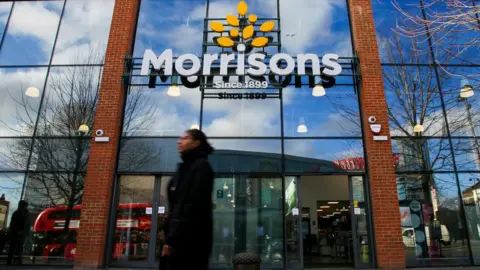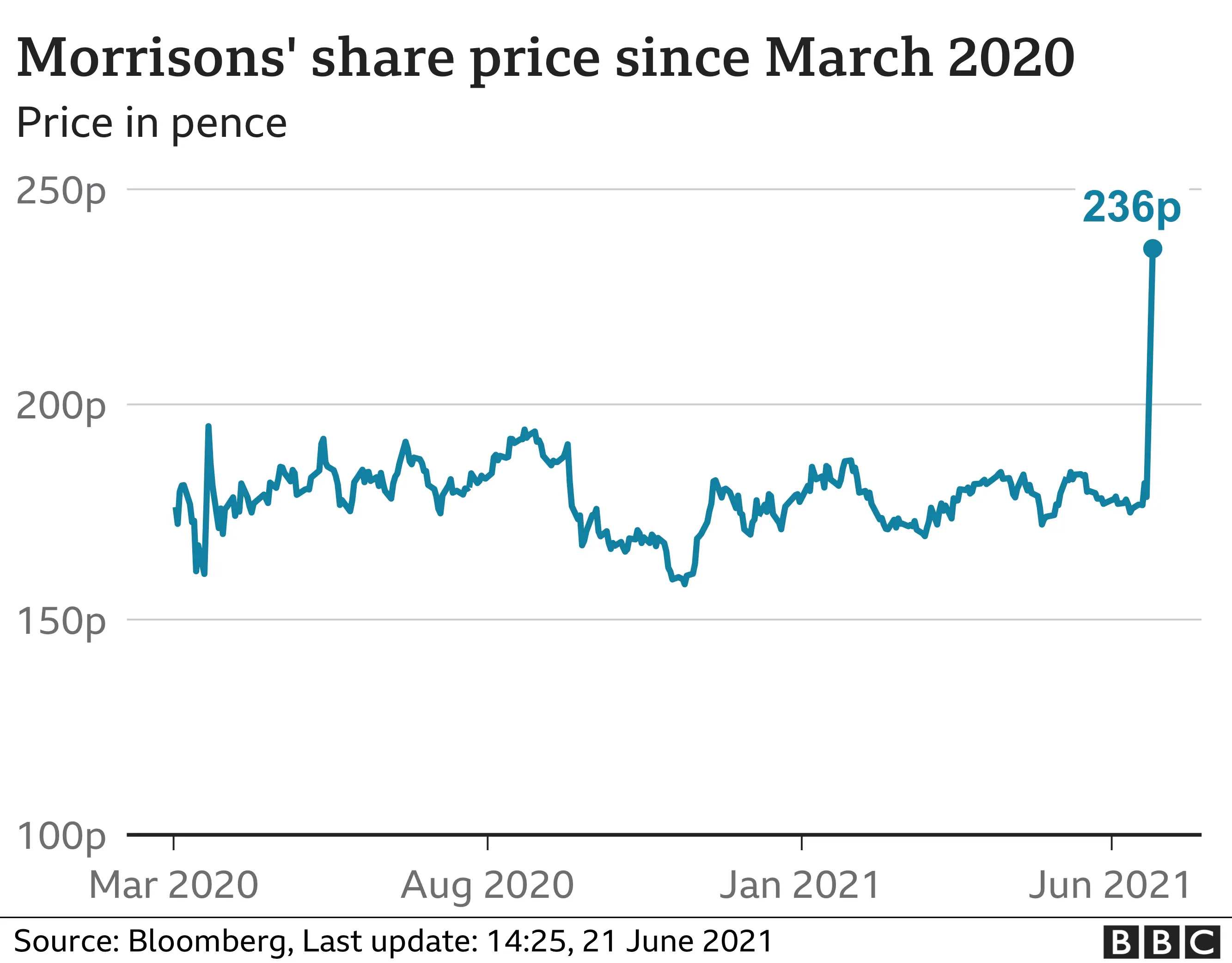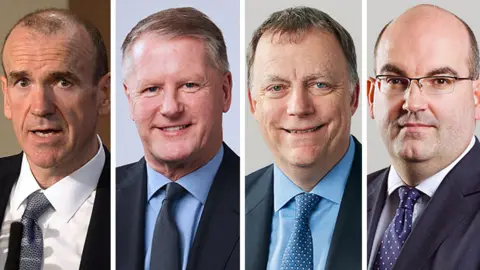Morrisons' share price soars 28% on takeover offer
 Getty Images
Getty ImagesMorrisons' share price has surged by 28% after a US private equity firm made an offer to buy the supermarket group for £5.5bn.
The shares closed at 228p on Monday, just below the 230p-a-share proposed by Clayton Dubilier & Rice.
Morrisons' board has rejected the offer, saying it "significantly undervalued" the business "and its future prospects".
However, there is speculation the move may prompt others to bid for the group.
Morrisons - the UK's fourth-largest supermarket chain - has nearly 500 shops and employs about 118,000 people.
George McDonald, executive editor of the publication Retail Week, said CD&R's proposal "could flush out more bidders".
He pointed to private equity firms Apollo Global Management and Lone Star Funds, which had been interested in buying Asda.
"But one of the interesting things about Morrisons is the closeness of its relationship with Amazon," he told the BBC's Today programme.

Morrisons has had a relationship with Amazon since 2016, under which the supermarket sells fresh produce and food through Amazon's website.
Mr McDonald said: "Amazon hasn't, so far, really become a force to be reckoned with in food but it would like to be. You wonder whether this situation might flush out interest from them."
Amazon owns the US supermarket chain Whole Foods, which also has seven outlets in the London.
Under UK takeover rules, CD&R has until 17 July to announce a firm intention to bid or walk away. Its initial proposal offers 230p per share for Morrisons.
In addition to the cash offer, CD&R would take on Morrisons' £3.2bn of debt, taking the total value of any deal to almost £9bn.
However, Legal and General Investment Management, which is a top 10 shareholder in Morrisons, criticised the private equity firm's approach.
Andrew Koch, L&G senior fund manager, told the Financial Times that the retail sector in general "looks undervalued", adding: "Private equity look to be interested in Morrisons partly because it has a lot of freehold property which they would 'sale and leaseback' to generate cash to pay back to themselves."
Morrisons owns the freehold on around 85% of its properties including its supermarkets.Mr Koch said: "That's not adding any genuine value, and the company could do that themselves. So I would personally not expect a bid to succeed at that level."
 Reuters
ReutersA successful bid by CD&R for Morrisons would mark the second time this year that a private equity firm has been involved in the takeover of a UK supermarket.
Earlier this year, TDR Capital and the Blackburn-based Issa brothers bought a majority stake in Asda from US parent Walmart, valuing the supermarket at £6.8bn.
However, Seema Malhotra, Labour's shadow minister for business, expressed caution about what a potential takeover of Morrisons could mean for the workforce.
"Our supermarkets... need owners that put the long-term interests of the business and its employees first," she said.
"When Debenhams went bust we saw private equity firms walk away while employees lost their jobs and staff who have paid into the pension scheme were left out of pocket. Too often dodgy private equity firms load the companies with debt and leave while pocketing the dividends. This has to end."
The shop workers' union, Usdaw, declined to comment on CD&R's proposal and what it could mean for jobs.
CR&R has made investments in UK retail in the past - it banked £1bn from selling its stake in discount chain B&M - and it counts Sir Terry Leahy, the former chief executive of Tesco, as a senior adviser.
Morrisons' entire executive board is made up of former Tesco executives, including chief executive David Potts, chief operating officer Trevor Strain and chief financial officer Michael Gleeson. Morrisons' chairman Andrew Higginson was also a long-time executive at Tesco.
 Getty Images/Wm Morrison
Getty Images/Wm Morrison Through CD&R, Sir Terry is also chairman of Motor Fuel Group which operates hundreds of petrol forecourts and convenience stores.
In 2018, CD&R acquired convenience and petrol forecourt firm MRH for £1.2bn. Together Motor Fuel Group and MRH operate some 900 sites selling brands such as BP Esso and Shell as well as Budgens, Costa Coffee and Spar.
Unlike Tesco and Sainsbury's, Morrisons has few convenience stores. A deal with CD&R could see the supermarket's brand rolled out across Motor Fuel Group's sites.
Asda's new owners, Zuber Issa and Mohsin Issa, are also the co-chief executives of EG Group, which operates more than 6,000 convenience and petrol forecourts sites across 10 countries. Through the Asda deal they acquired 323 convenience and petrol forecourts.
'Surprising'
Shares across retail-related companies rose following the emergence of the bid approach.
Ocado, the grocery delivery and distribution platform, saw its shares rise 5%, Sainsbury's added 3.7% and Tesco climbed 1.1%.
Despite being one of the retail sectors allowed to stay open throughout the entirety of Covid, some supermarkets have seen their share prices underperform.
Michael Hewson, chief market analyst at CMC Markets, said this was "surprising" given the resilience shown by the supermarkets amid the pandemic.
"While in the case of Morrisons profits halved last year, like-for-like sales growth remained resilient in its first quarter, rising 2.7%, despite the tough comparatives of last year, when sales surged for all three as people stockpiled all manner of staples."
For the year to the end of January, Morrisons reported a 50.7% drop in annual pre-tax profit before exceptional items to £201.1m.
The supermarket paid back £230m of business rates relief that the government had granted to businesses to help them through Covid.
Earlier this month, Morrisons faced a significant backlash over bonuses from investors at its annual general meeting
The company's board had stripped out the cost of the pandemic when calculating bonuses for senior staff.
